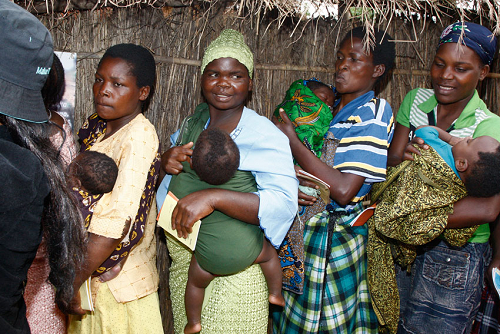Structural reforms can help poorest countries break 'vicious' economic circle – new UN report
The world's poorest countries are trapped in an economic vicious circle, which pins them in poverty and must be reversed if new development goals are to be met, according to a newly released report from United Nations Conference on Trade and Development (UNCTAD).

Mothers and their infant children at the Mwandama Millennium Village, Malawi.
The Least Developed Countries Report 2014 argues that those nations, known as “LDCs” are the battleground on which the UN-led post-2015 development agenda will be won or lost.
The report – subtitled Growth with Structural Transformation: A Post-2015 Development Agenda calls on the international community to learn from the failure of most of the poorest countries in meeting the Millennium Development Goals (MDGs) despite registering strong economic growth – a phenomenon the Report dubs the "LDC paradox".
This paradox arises from the failure of LDC economies to achieve structural changes despite having grown vigorously as a result of strong export prices and rising aid flows.
According to the UN, from 2002 to 2008, LDC growth exceeded the 7 per cent target agreed by the international community, and even after the 2008 financial crisis they grew faster than other developing countries, at an average of 5.7 per cent per year.
However, only one LDC – the Lao People's Democratic Republic – is on track to achieve all seven of the MDG targets analyzed in the report, and only four of the 39 LDCs outside South and South-East Asia (Ethiopia, Malawi, Rwanda and Uganda) are on track to meet even a majority of these targets.
Under the MDGs, global poverty was halved by rapid progress in the more advanced developing countries, the report says.
But a central goal of the post-2015 development agenda is expected to be the eradication of poverty by 2030. This means reducing it to zero everywhere – and it is in the LDCs that this will be most challenging. Their performance, the report says, will largely determine the success or failure of the whole post-2015 development agenda.
Eradicating poverty in 15 years is a much more ambitious goal than the MDG target of halving it in 25 years. Even China has not achieved this, despite extraordinary economic growth and development for twice as long.
Moreover, prospects for export prices are now much more uncertain following the financial crisis, while aid to LDCs has stopped increasing as donor countries implement austerity policies.
The report highlights three key policy priorities as part of a post-2015 development agenda for LDCs which include mobilizing resources for investment, directing these resources towards transforming economies and establishing macroeconomic policies that promote investment and demand growth. Diversifying rural economies is also critical eradicating poverty.
Donors must fulfil their long-standing commitments and critical to progress are changes in the international financial system and international trade system, and also prompt action to tackle climate change.
Development is not just about economic growth, the report notes. Development requires structural transformation of the economic base in two parallel processes: increasing labour productivity in productive activities and shifting labour from activities with low productivity – such as small-scale agriculture and services outside the formal economy – to more dynamic activities with higher productivity, such as manufacturing and high-value services.
It is not just economic growth that determines LDCs' performance in meeting the MDGs, but the combination of these two processes of structural transformation.
The core of the post-2015 development agenda should be a virtuous circle between economic and human development, reversing the vicious circle currently trapping LDCs, the report says.
Reducing poverty, improving nutrition and health, and boosting education increase people's productive potential.
Forty-eight countries are currently designated by the United Nations as LDCs.
Source: United Nations
- 347 reads
Human Rights
Ringing FOWPAL’s Peace Bell for the World:Nobel Peace Prize Laureates’ Visions and Actions

Protecting the World’s Cultural Diversity for a Sustainable Future

The Peace Bell Resonates at the 27th Eurasian Economic Summit

Declaration of World Day of the Power of Hope Endorsed by People in 158 Nations

Puppet Show I International Friendship Day 2020

